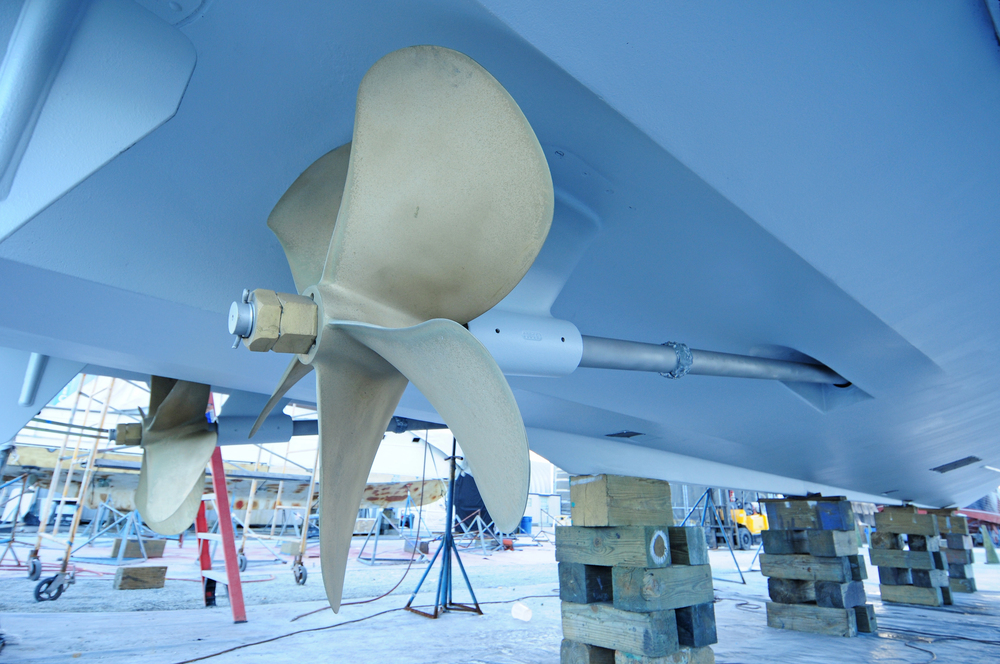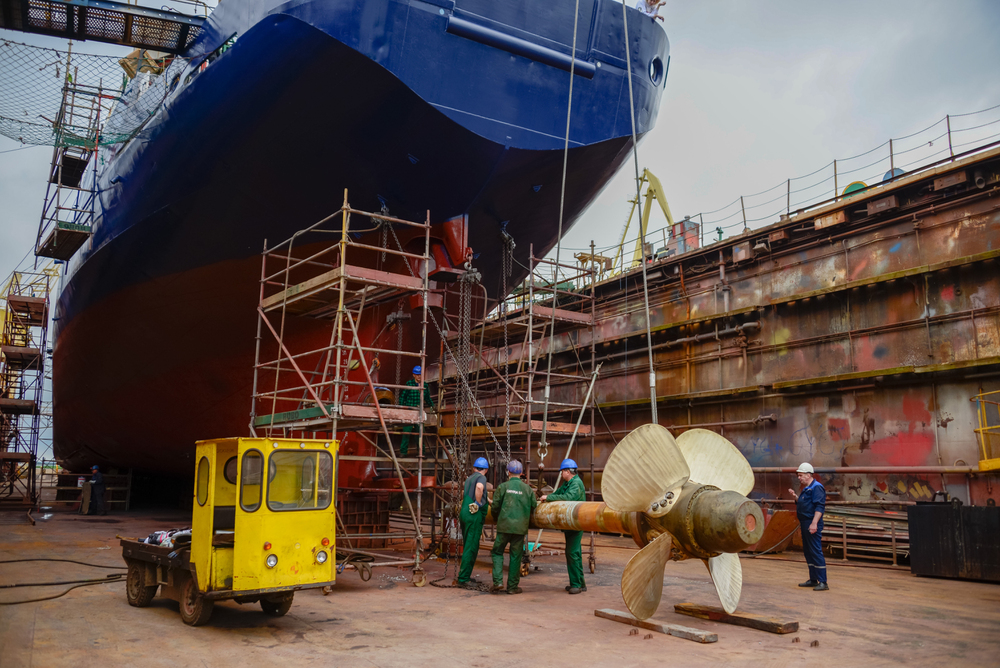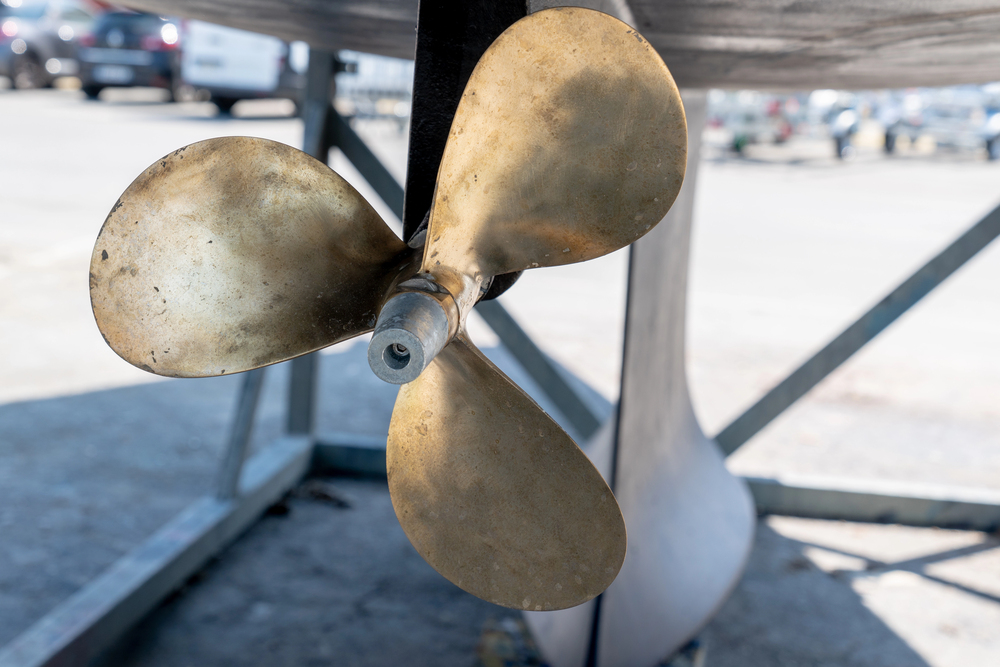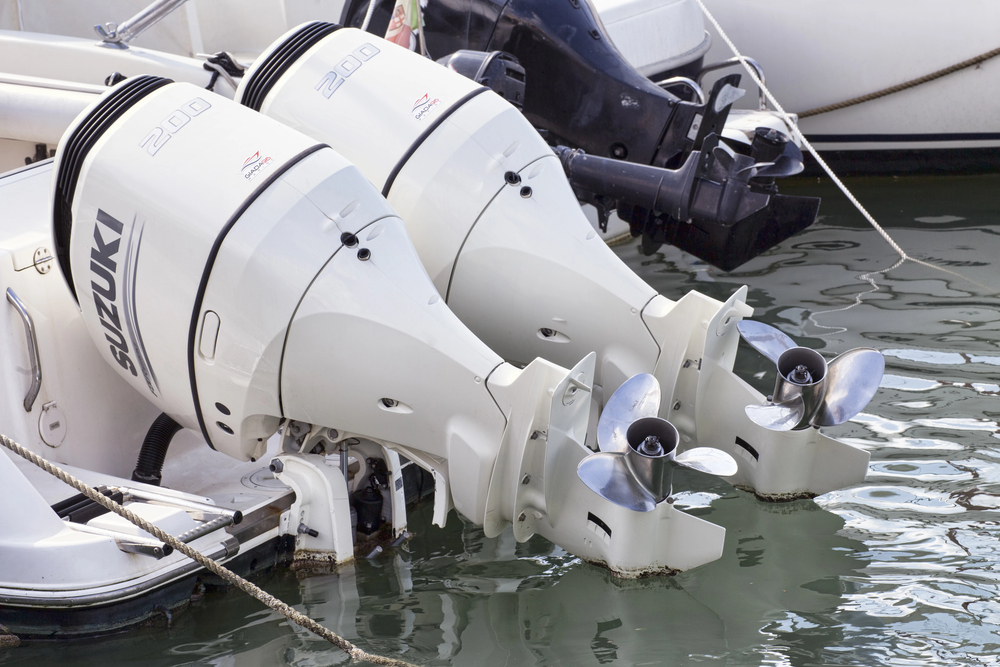Ship anodes are vital components of a boat’s maintenance system, playing a central role in protecting its hull and underwater components from corrosion. Ship anodes act as sacrificial devices, meaning they corrode instead of the more important metal parts of the boat. This process, known as cathodic protection, prevents the corrosion of the boat’s hull, propellers, and rudders, all of which are constantly exposed to water. Let us dive into how ship anodes work, the types available, and why regular maintenance is important.
At Hull 2 Prop, we specialize in boat underwater maintenance and hull cleaning, making sure your vessel stays corrosion-free and performs optimally. We also offer services such as boat sacrificial anodes replacement and underwater boat repairs to keep your boat in prime condition.
What Are Ship Anodes?
Ship anodes, also known as sacrificial anodes, are metal components installed on the boat’s submerged parts. They are made from highly reactive metals such as zinc, aluminum, or magnesium. These metals are selected because they corrode more easily than the boat’s hull and other important metal parts. This sacrificial corrosion makes sure that the boat’s vital components remain protected and free from degradation.
When a boat’s metal parts, such as the hull, come into contact with water, they become vulnerable to corrosion. This happens because water acts as an electrolyte, allowing an electrochemical reaction to occur that causes metal parts to rust or corrode. Sacrificial anodes are placed in contact with these metal parts to direct the corrosion away from the more vital areas of the boat.
How Do Ship Anodes Work?
Ship anodes function through a process called cathodic protection. When a metal part of the boat comes into contact with water, it begins to corrode. The sacrificial anode, being a more reactive metal, begins to corrode instead of the boat’s metal parts. This process redirects the corrosion to the anode, preserving the integrity of the boat’s hull and other components.
The reason sacrificial anodes work is due to the difference in electrical potential between the metals. When a reactive metal such as zinc is placed near the boat’s hull, the zinc will corrode in preference to the hull’s metal. The current generated by the anode’s corrosion prevents the hull from rusting and degrading.
The Importance of Ship Anodes
Ship anodes are necessary for long-term protection against corrosion. Without them, the metal parts of the boat, especially those submerged in the water, would experience rapid deterioration. This corrosion can lead to weakened structural integrity, affecting the performance of the vessel. Not only does it hinder the boat’s operation, but it can also result in costly repairs, downtime, and the need for extensive maintenance.
Here’s why ship anodes are necessary:
- Protection from Corrosion: Anodes protect the boat’s metal parts from the damaging effects of water, particularly in saltwater environments where corrosion is accelerated. Saltwater is especially harsh, and without an effective sacrificial anode, the boat would face severe corrosion.
- Increased Boat Lifespan: Regular maintenance of sacrificial anodes prevents long-term damage to the hull, propeller, and rudder, extending the life of the boat. By sacrificing the anode, the more important metal components are saved from corrosion, making sure the boat stays in top shape for years.
- Reduced Maintenance Costs: Preventing corrosion means fewer repairs and less frequent hull replacements, ultimately saving boat owners money. The cost of replacing sacrificial anodes is minimal compared to the potential damage that could occur without them.
Types of Ship Anodes
There are three main types of sacrificial anodes used to protect a boat from corrosion: zinc, aluminum, and magnesium. Each type is suited for different environments and applications. Selecting the right anode is necessary for making sure you get optimal protection for your boat’s underwater components, such as the hull, propellers, and rudder. Here’s a closer look at each type of ship anode:
Zinc Anodes
Zinc anodes are the most commonly used type of sacrificial anode. They are highly effective in saltwater environments and are ideal for most boats that operate in the ocean or other high-salinity waters. Zinc is highly reactive in seawater, making it an excellent choice for preventing the corrosion of metal parts such as the hull and propellers.
Zinc anodes work by sacrificing themselves to protect the more vital components of the boat. They are widely available, affordable, and well-suited for a variety of boat sizes and types.
Advantages of Zinc Anodes:
- Ideal for saltwater applications: Zinc anodes work best in high-salinity environments, where corrosion is most aggressive.
- Long-lasting protection: Zinc offers effective and lasting protection for underwater metal parts, minimizing the risk of corrosion.
- Widely available and cost-effective: Zinc is easy to find and relatively inexpensive, making it a popular choice for many boat owners.
Disadvantages of Zinc Anodes:
- Not as effective in freshwater: Zinc anodes are less effective in freshwater environments, where they corrode more slowly.
- Can be heavier than other anode materials: Zinc is denser and heavier than aluminum, which might not be ideal for smaller boats or certain applications.
Aluminum Anodes
Aluminum anodes are a lightweight alternative that works effectively in both saltwater and freshwater environments. These anodes are especially suitable for boats that operate in areas with mixed water types or for smaller boats. Aluminum anodes are also more environmentally friendly compared to zinc, as they contain less toxic material.
Advantages of Aluminum Anodes:
- Suitable for both saltwater and freshwater: Aluminum anodes are versatile, offering protection in both environments.
- Lighter than zinc anodes: The lower weight makes aluminum anodes ideal for smaller boats or vessels where weight is a concern.
- More environmentally friendly than zinc: Aluminum anodes have less environmental impact compared to zinc, making them a more eco-conscious option.
Disadvantages of Aluminum Anodes:
- Less effective in very high-salinity conditions: While aluminum works in both saltwater and freshwater, it is not as effective in extremely high-salinity environments compared to zinc.
- More expensive than zinc: Aluminum anodes tend to be pricier than zinc, though their versatility may justify the added cost.
Magnesium Anodes
Magnesium anodes are highly effective in freshwater environments, such as lakes and rivers. They are the most reactive of the three types and offer the best protection in low-salinity environments. Magnesium anodes are ideal for boats that primarily operate in freshwater and offer robust protection against corrosion in those waters.
Advantages of Magnesium Anodes:
- Highly effective in freshwater: Magnesium anodes are the best choice for freshwater environments, where they react aggressively to prevent corrosion.
- Offers the most protection in low-salinity environments: Magnesium offers the best sacrificial protection in rivers and lakes where the water is less salty.
Disadvantages of Magnesium Anodes:
- Not effective in saltwater: Magnesium anodes corrode too quickly in saltwater and are not suitable for boats operating in the ocean or coastal areas.
- Corrodes quickly in high-salinity environments: Magnesium anodes are not designed for use in high-salinity water and will deteriorate rapidly if exposed to such conditions.
How to Choose the Right Ship Anode for Your Boat
Choosing the right ship anode depends on several factors, including the type of water your boat operates in, the size of the boat, and the specific components that need protection. For boats in saltwater environments, zinc or aluminum anodes are typically the best options. Zinc anodes are ideal for high-salinity waters, while aluminum is great for boats that operate in mixed water conditions. Magnesium anodes, on the other hand, are best for freshwater environments where their high reactivity offers the most protection.
Regularly checking and replacing your sacrificial anodes is necessary to keep your boat protected from corrosion. At Hull 2 Prop, we offer professional boat underwater maintenance and hull cleaning services, making sure your boat remains in top condition. Our team can inspect and replace your boat sacrificial anodes to make sure your boat is always protected from corrosion.
Hull Maintenance and Underwater Boat Repairs
In addition to inspecting and replacing sacrificial anodes, it is important to conduct regular boat underwater maintenance to prevent the buildup of marine organisms that can contribute to corrosion. Hull cleaning helps remove algae and barnacles that could create rough surfaces on the hull, increasing drag and wear.
If your boat’s hull or underwater parts show signs of damage or corrosion, underwater boat repairs may be necessary. Early intervention prevents larger issues from developing, saving you money on extensive repairs later.
The Role of Hull 2 Prop in Sacrificial Anode Maintenance
We specialize in maintaining your boat sacrificial anodes, making sure they continue to protect your boat from corrosion. Our team offers expert boat underwater maintenance and hull cleaning services, making sure your boat is ready for the water and free from damaging growth. We also perform underwater boat repairs to address any damage caused by corrosion.
Regularly checking and replacing sacrificial anodes is one of the simplest and most effective ways to keep your boat in top condition. Our team is here to help with all your maintenance needs, making sure your boat stays protected and performs at its best.
Ship anodes are necessary for protecting your boat from corrosion and extending its lifespan. They work by sacrificing themselves to protect the boat’s hull and other metal components from the corrosive effects of water. By regularly inspecting and replacing sacrificial anodes, you can keep your boat safe and reduce the need for expensive repairs.
We understand the importance of maintaining your boat sacrificial anodes. We offer expert services in boat underwater maintenance and hull cleaning to make sure your boat stays in prime condition. Regular maintenance and anode replacement are simple, cost-effective steps that can save you from larger issues down the line.







